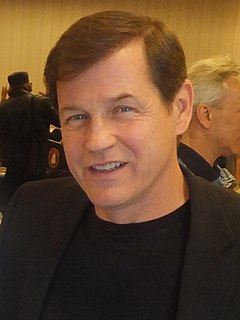A Quote by Michael Pare
Twelve states in the Great Plains have a wind energy potential greater then the electric use of our entire nation.
Related Quotes
If we do not learn to eliminate waste and to be more productive and more efficient in the ways we use energy, then we will fall short of this goal [for the Nation to derive 20 percent of all the energy we use from the Sun, by 2000]. But if we use our technological imagination, if we can work together to harness the light of the Sun, the power of the wind, and the strength of rushing streams, then we will succeed.
A period of about twelve years measured the beat of the pendulum. After the Declaration of Independence, twelve years had been needed to create an efficient Constitution; another twelve years of energy brought a reaction against the government then created; a third period of twelve years was ending in a sweep toward still greater energy; and already a child could calculate the result of a few more such returns.
The sunlight ... that strikes Earth’s land surface in two hours is equivalent to total human energy use in a year. While much of that sunlight becomes heat, solar energy is also responsible for the energy embodied in wind, hydro, wave, and biomass, each with the potential to be harnessed for human use. Only a small portion of that enormous daily, renewable flux of energy will ever be needed by humanity.
One of the biggest issues with renewables right now is the fact that if the wind isn't blowing, if the sun isn't shining, we don't have energy. Many people are working on storage technology so when the wind isn't blowing, we can use the energy stored in our giant batteries, essentially. But what happens if we don't have enough stored energy?
The most straightforward path would be if we could bring the cost of solar electric and wind down by another factor of say, three, and then have some miraculous storage solution, so that not only over the 24-hour day but over long periods of time where the wind doesn't blow, you have reliable energy. That's a path. But energy storage is hard. That's not a guaranteed path.
The Environmental Protection Agency's first-ever limits on carbon pollution from power plants will create clean- energy jobs, improve public health, bring greater reliability to our electric power grid, bolster our national security, demonstrate the United States' resolve to combat climate change and maybe even reduce our utility bills.
The decision to attack the entire nation [of Yugoslavia] has been counterproductive, and our destruction of civilian life has now become senseless and excessively brutal. ... The United States' insistence on the use of cluster bombs, designed to kill or maim humans, is condemned almost universally and brings discredit on our nation (as does our refusal to support a ban on land mines). Even for the world's only superpower, the ends don't always justify the means.
Each child represents either a potential addition to the protective capacity and enlightened citizenship of the nation or, if allowed to suffer from neglect, a potential addition to the destructive forces of a community. . . . The interests of the nation are involved in the welfare of this array of children no less than in our great material affairs.



































